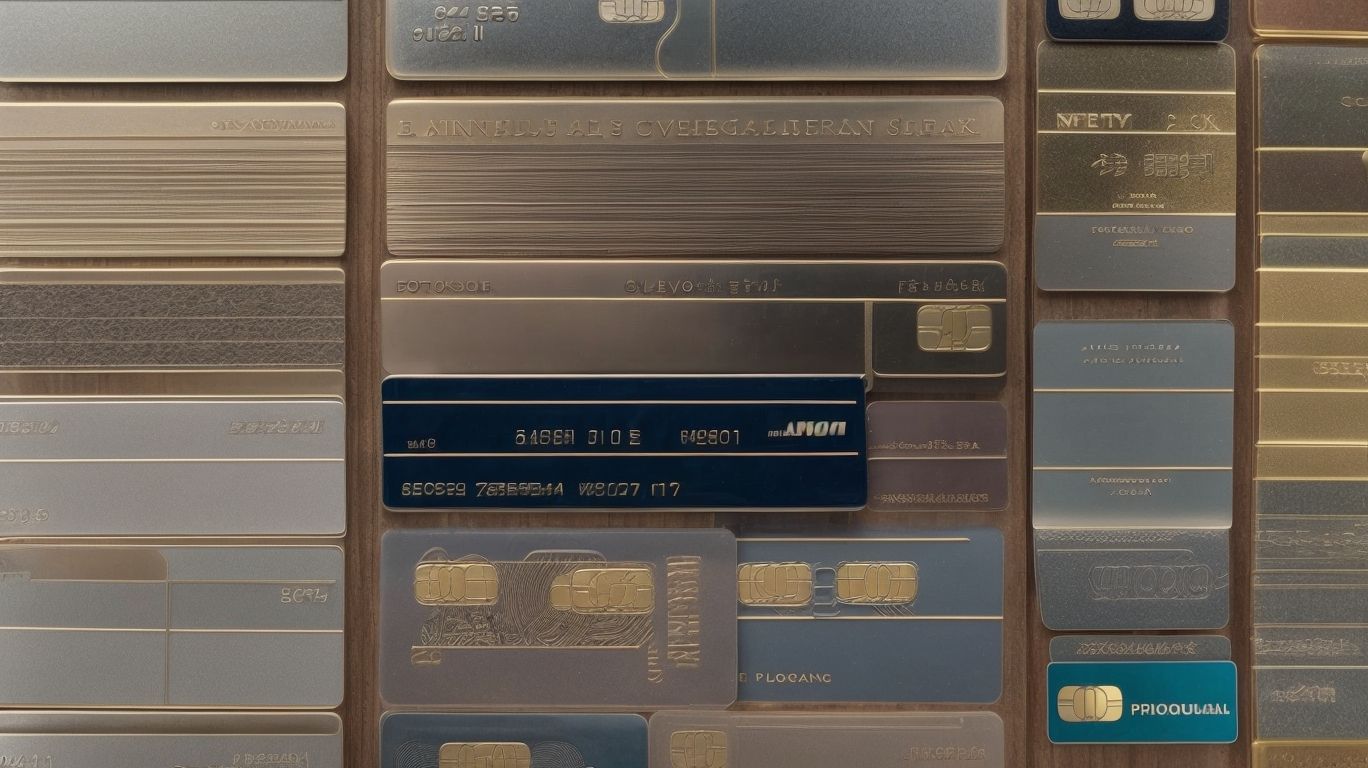Business credit cards are specially designed for businesses to help them manage their finances and expenses. These cards function similarly to personal credit cards, but they offer additional benefits and services tailored to the needs of businesses.
The main purpose of business credit cards is to help businesses keep their personal and business expenses separate. They also provide opportunities for business owners to earn rewards and perks, build their business credit, and manage their cash flow effectively.
Using a business credit card has various benefits, including:
- Separation of Personal and Business Expenses: Business credit cards allow you to keep your personal and business expenses separate, making it easier to track and manage your business finances.
- Building Business Credit: By consistently using and making on-time payments with your business credit card, you can build a strong credit history for your business. This can help your business secure loans and other types of credit in the future.
- Access to Rewards and Perks: Many business credit cards offer rewards and perks such as cashback, travel points, and discounts on business expenses, which can help save your business money.
- Improved Cash Flow Management: Business credit cards provide a revolving line of credit, allowing businesses to make necessary purchases without having to pay for them upfront.
There are different types of business credit cards available, including:
- Small Business Credit Cards: These are designed for small businesses and offer benefits tailored to their needs.
- Corporate Credit Cards: These are designed for larger companies and usually come with higher credit limits and more specialized services.
- Charge Cards: These cards do not have a preset spending limit and require the full balance to be paid each month.
When choosing the right business credit card for your company, consider factors such as your business’s needs, interest rates and fees, rewards and perks offered, and additional features and services.
To apply for a business credit card, you will need to meet certain requirements such as having a business entity, a business credit history, a personal credit score, and a certain amount of annual revenue. To apply, you can visit the credit card issuer’s website or apply in-person at a bank or credit union.
When using a business credit card, it’s important to keep in mind the dos and don’ts, such as paying on time, keeping track of your expenses, and avoiding using the card for personal expenses. By following these guidelines, a business credit card can be a valuable tool in managing and growing your business.
Key Takeaways:
What Are Business Credit Cards?

Photo Credits: Rizalnews.Com by Philip Hernandez
Business credit cards are financial tools designed for business owners to effectively manage their expenses. These cards provide a revolving line of credit with specific features tailored to the needs of businesses. With a business credit card, you can separate business and personal expenses, track spending, and earn rewards or cashback on eligible purchases.
They offer benefits like higher credit limits, expense management tools, and employee spending controls. Business credit cards are widely accepted and can be used for various business-related expenses, such as office supplies, travel, and client entertainment.
The history of business credit cards can be traced back to the early 1900s when oil companies issued special cards to their business customers for fuel purchases. Over time, these cards evolved into general-purpose charge cards and eventually led to the development of modern business credit cards that we use today.
How Do Business Credit Cards Work?

Photo Credits: Rizalnews.Com by Samuel Lopez
Business credit cards are a valuable financial tool for businesses. Here is a step-by-step guide on how they work:
- Application: Apply for a business credit card using your company’s information, including revenue and credit history.
- Approval: The credit card issuer will review your application and determine if you meet their requirements.
- Credit Limit: Once approved, you will be assigned a credit limit based on your company’s financials.
- Card Usage: Use the business credit card to make purchases for your business expenses.
- Repayment: Pay off the balance each month or carry a balance with interest charges.
- Rewards: Earn rewards, such as cashback or travel points, on your business expenses.
- Financial Management: Track your expenses and manage your business finances more efficiently with monthly statements and online tools.
What Are the Benefits of Using a Business Credit Card?

Photo Credits: Rizalnews.Com by Michael Thompson
As a business owner, it is important to have financial tools that cater specifically to your business needs. One such tool is a business credit card, which can offer numerous benefits compared to using a personal credit card. In this section, we will discuss the benefits of using a business credit card, including the separation of personal and business expenses, building business credit, access to rewards and perks, and improved cash flow management. These benefits make a business credit card a valuable asset for any business owner.
1. Separation of Personal and Business Expenses
Separating personal and business expenses is essential for maintaining financial organization and complying with tax regulations when utilizing a business credit card. Follow these steps to ensure effective separation:
- Acquire a dedicated business credit card solely for business expenses.
- Establish a separate business bank account to cover the charges on the credit card.
- Keep all business receipts and documents separate from personal ones.
- Maintain accurate records of all business expenses and payments made with the credit card.
- Avoid using the business credit card for personal expenses, and vice versa.
- Regularly review credit card statements to identify and categorize business expenses.
- Utilize accounting software to track and manage business transactions made with the credit card.
- Consult with a tax professional to ensure compliance with tax regulations and maximize deductions.
2. Building Business Credit
Building business credit is crucial for the financial stability and growth of any company. Follow these steps to establish business credit:
- Establish a business entity: Register your business as a legal entity, such as an LLC or corporation, to separate personal and business finances.
- Obtain an Employer Identification Number (EIN): Apply for an EIN from the IRS to identify your business for tax purposes and credit applications.
- Open a business bank account: Maintain a separate business bank account to track business transactions and establish a banking relationship.
- Apply for a business credit card: Choose a business credit card that reports to business credit bureaus and use it responsibly to build a positive credit history.
- Pay bills on time: Ensure prompt payment of all business-related bills, such as vendor invoices and loans, to establish a good payment history.
- Monitor and review your credit: Regularly check your business credit reports and scores to identify any errors or discrepancies.
- Establish trade credit: Work with suppliers and vendors who report your payment history to business credit bureaus, helping to build your credit profile.
- Diversify credit accounts: Apply for various types of credit, such as business loans or lines of credit, to demonstrate your ability to handle different types of debt.
3. Access to Rewards and Perks
Accessing rewards and perks is one of the main advantages of using a business credit card. To make the most of these benefits, follow these steps:
- Research rewards programs: Compare different cards and their rewards structures to find the best fit for your business.
- Earn rewards: Use your card for eligible purchases and earn points, cashback, or travel miles based on your rewards program.
- Redeem rewards: Once you accumulate enough points, cash them in for various perks such as travel upgrades, gift cards, or statement credits.
- Utilize additional benefits: Take advantage of additional perks like airport lounge access, purchase protection, or extended warranties.
- Monitor and optimize: Regularly review your rewards program to ensure you are maximizing your earning potential and utilizing all available perks.
4. Improved Cash Flow Management
Improved cash flow management is a major advantage of utilizing a business credit card. To effectively manage cash flow with a business credit card, follow these steps:
- Track Expenses: Use your business credit card for all business-related expenses to consolidate and keep track of spending.
- Set Payment Schedule: Make sure to pay your credit card bill on time to avoid late fees and interest charges.
- Manage Credit Limit: Strategically utilize your credit card’s available limit to maintain cash flow stability.
- Take Advantage of Grace Period: Make use of the interest-free period to manage short-term cash flow needs.
- Automate Payments: Set up automatic payments to ensure timely repayment and prevent missed payments.
What Are the Different Types of Business Credit Cards?

Photo Credits: Rizalnews.Com by Samuel Campbell
Business credit cards come in various forms, each designed to meet the specific needs of different types of businesses. In this section, we will discuss the different types of business credit cards available and their unique features. We’ll start with small business credit cards, which are tailored for the needs of small business owners. Then, we’ll explore corporate credit cards, which are commonly used by larger companies. Finally, we’ll take a look at charge cards, a type of business credit card that requires the full balance to be paid off each month.
1. Small Business Credit Cards
Small business credit cards are a valuable tool for business owners. When choosing the right small business credit card for your company, there are a few steps to consider:
- Identify your business needs and goals.
- Compare interest rates and fees of different credit cards.
- Look at the rewards and perks offered by each card.
- Check for additional features and services, such as expense tracking or employee card management.
During my research for small business credit cards, I carefully considered my business needs and goals. After comparing various options, I found a credit card with low interest rates and great rewards. This card also offered additional features such as expense tracking, which has helped me efficiently manage my business finances. Thanks to this small business credit card, I have been able to build my company’s credit and effectively manage cash flow.
2. Corporate Credit Cards
Corporate credit cards are a specialized type of business credit card designed for larger companies. They offer various benefits, including increased spending power, simplified expense reporting, and centralized billing. These cards provide businesses with a convenient way to manage employee expenses while maintaining control and oversight. In addition to their primary features, corporate credit cards often come with added perks such as travel rewards, expense management tools, and customizable spending limits. To qualify for a corporate credit card, companies typically need a strong business credit history, high annual revenue, and solid financial standing.
Overall, corporate credit cards are a valuable asset for businesses seeking to streamline and optimize their expense management processes.
In the 1950s, American Express launched the first corporate credit card, primarily targeting large corporations. These early corporate cards focused on providing convenient payment options and expense tracking for corporate travel and entertainment expenses. Over time, corporate credit cards have evolved to offer a wider range of features and benefits, catering to the specific needs of businesses. Today, corporate credit cards remain a crucial financial tool for large companies, helping them effectively and efficiently manage their expenses.
3. Charge Cards
Charge cards are a type of business credit card that requires the balance to be paid in full each month. With charge cards, there is no preset spending limit, giving businesses flexibility in their expenses. This type of card is perfect for businesses that have consistent cash flow and can easily pay off the balance every month. Charge cards offer various benefits, including:
- Access to rewards and perks
- Improved cash flow management
- The ability to separate personal and business expenses
Some notable providers of charge cards are American Express and Diners Club.
Fun fact: In 1958, American Express introduced the first ever charge card.
How to Choose the Right Business Credit Card for Your Company?

Photo Credits: Rizalnews.Com by Ronald Thomas
Choosing the right business credit card is crucial for managing your company’s finances effectively. There are several factors to consider when selecting the perfect card for your business. In this section, we will discuss the key considerations in selecting a business credit card, such as your specific business needs, interest rates and fees, rewards and perks, and additional features and services offered. By the end, you will have a better understanding of what to look for in a business credit card that best suits your company’s financial goals and needs.
1. Consider Your Business Needs
When selecting a business credit card, it is crucial to take into account your specific business needs. Here are some steps to assist you in making the right decision:
- Evaluate your spending habits: Determine the types of purchases you typically make for your business.
- Identify your financial goals: Consider whether you want to earn rewards, build credit, or improve cash flow.
- Review card features: Look for benefits such as introductory APR offers, cashback rewards, or travel perks.
- Assess fees and interest rates: Compare annual fees, balance transfer fees, and the ongoing APR to ensure affordability.
- Consider card issuers: Research reputable banks or financial institutions that offer business credit cards.
- Read customer reviews: Gather insights from other business owners to learn about their experiences with different cards.
- Apply wisely: Submit an application for the card that aligns with your business needs and offers the most value.
2. Compare Interest Rates and Fees
When comparing interest rates and fees for business credit cards, follow these steps:
- Research: Explore various credit card options and gather information on their interest rates and fees.
- Compare interest rates: Compare the annual percentage rates (APRs) offered by different credit card issuers.
- Analyze fees: Look out for annual fees, late payment fees, balance transfer fees, and any other charges.
- Consider rewards: Evaluate if the rewards and perks offered by a credit card outweigh the associated fees.
Remember, it’s important to choose a credit card that aligns with your business needs and offers favorable terms and conditions.
3. Look at Rewards and Perks Offered
When selecting a business credit card, it is crucial to consider the rewards and perks that are available. Here are some steps to assist you in making an informed decision:
- Research rewards programs: Examine the various types of rewards that are offered, such as cashback, travel points, or discounts on business expenses.
- Consider your business spending: Evaluate which rewards align with your company’s spending habits. For instance, if your business requires frequent travel, a card that provides travel rewards may be advantageous.
- Review redemption options: Check if the rewards can be easily redeemed for valuable benefits or if there are any restrictions.
- Weigh annual fees: Assess if the rewards and perks outweigh the cost of the annual fee.
True story: Sarah, a small business owner, carefully assessed the rewards and perks offered by different business credit cards. She ultimately selected a card with a generous cashback program that aligned with her company’s expenses. Over time, she accumulated significant cashback rewards, which she utilized to invest in new equipment for her business, ultimately boosting its growth.
4. Check for Additional Features and Services
When selecting a business credit card, it is crucial to consider any additional features and services that can benefit your company’s financial management. Here are some steps to take in order to check for these extras:
- Review the credit card’s online banking platform for features such as expense tracking, spending analysis, and budgeting tools.
- Check if the card offers employee cards with individual spending limits and real-time transaction monitoring.
- Look for additional services such as travel insurance, purchase protection, and extended warranty coverage.
- Consider if the card provides access to business-specific perks, such as discounts on office supplies or travel expenses.
- Examine the rewards program to see if it aligns with your business needs, such as earning points on business-related expenses.
By following these steps, you can choose a business credit card that offers the ideal combination of features and services for your company’s financial needs.
What Are the Requirements for Getting a Business Credit Card?

Photo Credits: Rizalnews.Com by Keith Torres
As a business owner, having a credit card specifically designed for business use can be a valuable asset. However, obtaining a business credit card may not be as straightforward as getting a personal credit card. In this section, we will discuss the various requirements that must be met in order to qualify for a business credit card. These include having a registered business entity, a solid business credit history, a good personal credit score, and a certain level of annual revenue. Understanding these requirements will help you determine if a business credit card is the right choice for your company.
1. Business Entity
Choosing the right business credit card requires considering the structure of your business entity.
- Determine your business entity type, such as a sole proprietorship, partnership, corporation, or LLC.
- Understand the advantages and disadvantages of each business entity type in terms of liability, taxes, and legal requirements.
- Consider the financial separation between your personal and business finances that each type of entity provides.
- Evaluate the impact of your business entity type on your eligibility for a business credit card.
- Research the specific requirements and restrictions that credit card issuers have for each type of business entity.
2. Business Credit History
Having a strong business credit history is crucial when applying for a business credit card. Follow these steps to establish and maintain a positive business credit history:
- Register your business as a legal entity.
- Obtain a federal employer identification number (EIN).
- Open a business bank account and use it for all business transactions.
- Build relationships with vendors and suppliers who report payment history to credit bureaus.
- Ensure timely payments to vendors and lenders.
- Regularly monitor your business credit report and dispute any errors.
Maintaining a positive business credit history demonstrates financial responsibility and increases your chances of being approved for future credit applications.
3. Personal Credit Score
Your personal credit score is a crucial factor when seeking a business credit card. To ensure a strong personal credit score, follow these steps:
- Pay bills on time: Consistently paying your personal bills on time will help maintain a good credit history.
- Keep credit utilization low: Aim to use only a small percentage of your available credit to demonstrate responsible borrowing habits.
- Monitor your credit report: Regularly check your credit report for errors or discrepancies and address them promptly.
- Limit new credit applications: Avoid applying for too much new credit, as it can negatively impact your credit score.
By following these steps, you can improve your personal credit score and increase your chances of qualifying for a business credit card.
4. Annual Revenue
Having a clear understanding of your company’s annual revenue is crucial when selecting the appropriate business credit card. Each credit card issuer may have different requirements based on revenue thresholds. For instance, certain cards may be more suitable for small businesses with lower annual revenues, while others may provide higher credit limits and greater rewards for businesses with higher revenue.
To make a well-informed decision, carefully evaluate your business’s financials and projections, and compare different credit card options. Don’t forget to also take into account factors like interest rates, fees, rewards, and other features that align with your business needs.
How to Apply for a Business Credit Card?

Photo Credits: Rizalnews.Com by Frank Thompson
Applying for a business credit card involves several steps to ensure a smooth process and increase your chances of approval.
- Research: Compare different business credit card options and identify the one that best suits your needs.
- Gather Documents: Prepare the necessary documents, including your business financial statements, tax ID, and personal identification.
- Fill out Application: Complete the application form, providing accurate and up-to-date information about your business.
- Submit Application: Review your application for any errors or missing information and submit it along with the required documents.
- Wait for Approval: The credit card issuer will review your application and make a decision, which may take a few business days.
- Activate Card: Once approved, follow the instructions provided to activate your card and start using it for business expenses.
Remember to manage your business credit card responsibly and make timely payments to build a positive credit history. It’s also a good idea to regularly review your credit card terms and benefits to ensure they still align with your business needs.
What Are the Dos and Don’ts of Using a Business Credit Card?

Photo Credits: Rizalnews.Com by Bruce Scott
Using a business credit card can be a beneficial tool for managing expenses and building credit. However, it is important to understand the dos and don’ts in order to make the most of this financial tool. Here are some key steps to consider:
- Do set a budget and adhere to it to avoid overspending.
- Do pay your bill on time and in full to avoid incurring interest charges.
- Do regularly review your statements to identify any unauthorized charges.
- Don’t mix personal and business expenses on the same card to maintain financial clarity.
- Don’t exceed your credit limit as it can have a negative impact on your credit score.
- Don’t use your business credit card for cash advances, as they come with high fees and interest rates.
- Don’t forget to track and categorize your expenses for accurate bookkeeping.
Frequently Asked Questions
What is a business credit card?
A business credit card is a type of credit card specifically designed for business expenses. It allows businesses to make purchases and payments, track expenses, and earn rewards for business-related spending.
What are the benefits of using a business credit card?
There are several benefits to using a business credit card, such as earning rewards on business expenses, separating personal and business finances, and having a line of credit for short-term financing needs.
Do all business credit cards require a personal guarantee?
No, not all business credit cards require a personal guarantee. Some cards may only require a personal guarantee for sole proprietorships or new businesses without established credit.
How can I find the best business credit card for my needs?
You can use online publications and comparison services, such as The Ascent and Bankrate.com, to research and compare different business credit cards and their rewards rates, welcome offers, and other perks. It’s also a good idea to consult with industry experts, such as professional journalists and credit card experts, for their recommendations and advice.
What should I consider when choosing a business credit card?
When choosing a business credit card, you should consider factors such as your business travel costs, the type of rewards or cash back you prefer, the card’s welcome bonus offers, its annual fee, and any other business perks or money-saving benefits. It’s also important to check your FICO score and the credit approval requirements for the card you’re interested in.
How can I provide feedback on my digital experience with a business credit card?
You can provide feedback on your digital experience with a business credit card by answering the 4 simple questions Bank of America asks before you leave their website. Your feedback will be used to improve the digital experience for all customers, and you’ll be thanked for taking the time to share your thoughts. Additionally, you can reach out to the credit card company directly or leave a review on independent research and listing categories websites, such as The Motley Fool and The Points Guy.




